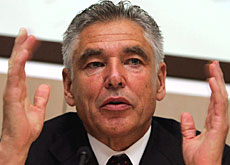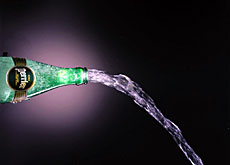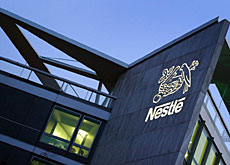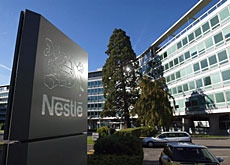Nestlé boss predicts sure and steady growth

Peter Brabeck, chief executive of Nestlé – the world’s largest food company – says shareholders should prepare for yet another year of steady but unspectacular growth.
In an interview with swissinfo, Brabeck explains why this approach is an important factor in the Swiss multinational’s success.
The Vevey-based company announced on Thursday that sales for the first nine months of the year were flat at SFr64.6 billion ($53 billion) – the same figure as last year.
The company, which makes Nescafé instant coffee and KitKat chocolate bars, said strong growth in the Americas had helped sustain sales despite a flagging performance in Europe.
Brabeck, however, says he expects to see an increase in full-year earnings and a further improvement in sales and profit in 2005.
He has also indicated that a number of investors are interested in buying Perrier, Nestlé’s struggling mineral water division, which has been hit by a dispute over planned productivity improvements.
French trade unionists have blocked a plan by Nestlé to cut almost 800 jobs in an effort to turn the company round.
swissinfo: You’ve mentioned that Nestlé continually shows steady but unspectacular growth. What is your strategy exactly?
Peter Brabeck: My strategy is… a delivery of long-term sustainable profitable growth. I’m not looking for spectacular results one quarter and then only to have everything go the other way the next quarter.
Over the past ten years, we have had an average organic growth of 5.7 per cent every single year. We have also had an improvement of the Earnings Before Interest, Taxes and Amortization (EBITA) margin year after year. There are no ups and downs. There’s one direction.
swissinfo: You consolidate in Swiss francs. How have you been hit by foreign exchange rates over the years?
P.B.: On average we are losing three per cent of our turnover every single year due to exchange rates. If we hadn’t had these fluctuations, our sales today would be far above SFr100 billion.
But this is something I cannot influence. I could propose changing to US dollar consolidation, but I think as long as we have a Swiss flag flying on top of our building, we should be consolidating in Swiss francs.
swissinfo: You haven’t exactly been satisfied with the performance of Perrier in France. How real is the threat that you might sell the brand because of labour problems there?
P.B.: I cannot say I am very satisfied with a business that has only made losses over the past couple of years and will also make a loss in 2004. And it is not just me. In two general assemblies, we had shareholders complaining to management about how much patience we have shown during this situation in the south of France.
Therefore, I have clearly indicated that if, within a reasonable period of time, we do not come to an agreement with the labour unions about increasing the productivity of a site that is highly unproductive – where productivity is a third of what we have in Italy or other places in France – we will have to consider the possibility of selling this business off.
swissinfo: How are rising energy prices affecting you?
P.B.: There is no doubt that the rising energy prices at the level we have them today, with oil at $50 a barrel and above, have an impact on our business… not so much in the factories, but…on the packaging costs, as oil is the main raw material for packaging.
swissinfo: Is that going to be a big problem for you?
P.B.: I think it depends on the business you are in. In the water business, it will have a substantial impact because PET (polyethylene terephthalate), which is the substance used to make our bottles, is basically oil-price dependent. In other product categories, for example, Maggi, I don’t think it is a major issue.
swissinfo: To a company such as yours, does it matter whether George Bush or John Kerry is the next president of the United States? They both have to eat, don’t they?
P.B.: They both have to eat and the American public has to eat. In general terms, I would say Nestlé normally refrains from any political interference in the countries where we are accepted.
We are not at the service of the government – we are at the service of the people in the countries where we are allowed to operate.
swissinfo-interview: Robert Brookes
Henri Nestlé introduced his infant cereal in 1867.
Nescafé was launched in 1938.
Nestlé has 511 factories in 86 countries around the world and employs 253,000 people.
The company has a 24.6 per cent direct holding in L’Oréal, the world’s number one cosmetics group.
Nestlé has developed a KitKat bar with a green tea flavour for the Japanese market.
Sales for the first nine months of the year were flat at SFr64.6 billion ($53 billion).
A further improvement of real internal growth and organic growth is expected in the last quarter.
CEO Peter Brabeck sees an improvement in net profit for the year as a whole.
In 2003, Nestlé reported a net profit of SFr6.213 billion on sales of SFr87.979 billion.

In compliance with the JTI standards
More: SWI swissinfo.ch certified by the Journalism Trust Initiative



You can find an overview of ongoing debates with our journalists here. Please join us!
If you want to start a conversation about a topic raised in this article or want to report factual errors, email us at english@swissinfo.ch.